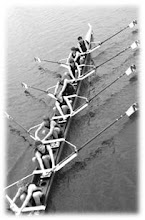By Marjorie Hagerman
Protein is used by the body to build and maintain cell tissues of all kinds - from blood to bone and especially muscle. Since an athlete usually has a higher proportion of lean body mass to fat and bone than the non-athlete, protein needs are slightly greater than those of the average person. Protein need is based on one's size and stage of growth and is expressed as grammes of protein required per kilogramme of body weight. A standard recommended daily allowance (RDA) chart found in any nutrition textbook will list a recommended protein intake for various age groups, based on an average weight. An individual athlete's protein need can be worked out more precisely by multiplying their weight in kilogrammes by 1.4 to obtain the recommended number of grammes of protein they need per day.
Example: An oarsman weighing 95 kilogrammes would need 133 grammes of protein each day. i.e. 95 kilogrammes x 1.4 grammes protein per kilogramme of body weight = 133 grammes protein per day
An athlete who is receiving the correct amount of protein each day will have enough to meet present body needs and also have enough additional protein to provide for any increase in lean muscle mass which may be realised through a weight training programme. It is not difficult to obtain this amount of protein through a balanced diet. Protein is available from many different foods in varying amounts:
Grammes Protein:
42g - 6 ounces of steak
40g - 6 ounce can of tuna
30g - half chicken breast
29g - pork tenderloin
28g - 4 ounces of most fish filets or steaks
28g - hamburger patty
14g - 2 servings of peanut butter
9g - 1 cup serving of dried beans or peas, cooked
8g- 1/2 pint of milk (any fat level)
8-12g - yogurt
6g - 1 egg
6g - 1 cup serving of cereal, potatoes, or pasta
3g - 1 slice of bread, 1/2 bread roll or bagel
2g - 1/2 cup serving of vegetables
In order to check whether they are getting enough protein in their diets, athletes may want to keep a record of everything eaten during one day, along with the amount of each, and use the protein equivalent value to calculate total protein available from these foods. Most athletes who follow a balanced diet that includes foods from all four food groups and has enough calories to maintain weight, will have no difficulty in meeting protein needs. The exceptions may be those who follow a strict vegetarian or vegan diet, or lightweight rowers who practice severe calorie intake restriction. Vegans who include no meat, fish, poultry, eggs, or dairy products in their diet should be concerned about getting enough high quality protein from their daily meals. These athletes should monitor their protein intake carefully and, if it is below the recommended amount for their body size, they may wish to consult a dietician to help incorporate more protein into their diet. For lightweight rowers, a 5 to 6% body fat for men or 10 to 11% for women represent dangerously low levels of body fat and should prompt immediate consultation with a dietician to adjust dietary intake.
In recent research conducted with candidates for US national teams, all of the men, both heavyweights and lightweights, obtained adequate protein from their diets to meet the recommended level of 1.4 grammes protein per kilogramme of body weight. In contrast, only 60% of the women, again including both light- and heavyweights, met their protein needs. More of the women tended to be vegetarians, or were at least limiting their intake of protein foods from both the meat and dairy groups. It is important to remember that, while carbohydrate is very important, so is protein, and protein intake must be adequate to meet the demands of the exercising body. It may be difficult for the heavyweight vegetarian rower to meet calorific and protein needs on a totally plant-based diet; the sheer bulk of such a diet may mean one is filled up before adequate calories and protein are consumed.
Occasionally athletes wonder about taking protein or amino acid supplements to boost their protein intake. This is unnecessary if one eats a balanced diet; in such a case protein intake from food will usually more than meet needs, and food is certainly the preferred source, since it comes packaged with other nutrients like the B complex vitamins, iron and zinc, all of which are important to an athlete's health. Keep in mind there are inherent dangers in consuming excessively high amounts of protein, whether from food or a combination of food plus protein supplements. Protein foods often carry saturated fat with them, so excess fat intake - something we are all urged to avoid for good health, particularly of our hearts - can accompany excess protein from foods. Since water is required to break down protein to its component amino acids before the body can use it, dehydration can also accompany a high protein intake. This is a particular risk for exercising athletes who require that body fluids be present at an optimum level to cool the working muscles. Also, any excess protein not required for either tissue maintenance or energy production is broken down by the body and stored as fat - again, an undesirable outcome for the competitive athlete.
Subscribe to:
Post Comments (Atom)

No comments:
Post a Comment